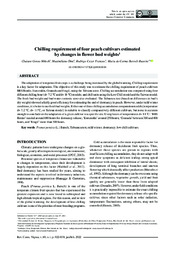Chilling requirement of four peach cultivars estimated by changes in flower bud weight.
Chilling requirement of four peach cultivars estimated by changes in flower bud weight.
Autoria: MILECH, C. G.; DINI, M.; FRANZON, R. C.; RASEIRA, M. do C. B.
Resumo: The adaptation of temperate fruit crops is a challenge being increased by the global warming. Chilling requirement is a key factor for adaptation. The objective of this study was to estimate the chilling requirement of peach cultivars BRS Bonão, Esmeralda, Granada and Eragil, using theTabuenca test. Chilling accumulation was computed using four different chilling hour (d+ 7.2 ºC and d+ 11 ºC) models; and chill units using the Low Chill model and theTaiwan model. The fresh bud weight and bud water contents were also evaluated. The Tabuenca test (based on differences in bud ́s dry weight) showed a fairly good efficiency for estimating the end of dormancy in peach. However, under mild winter conditions, it is better to use fresh bud weights. Either one of three chilling accumulation computation models (temperature d+ 7.2 °C, d+ 11°C, or Taiwan model) is suitable to classify comparatively dif ferent cultivars, but none is accurate enough to conclude on the adaptation of a given cultivar to a specific site. Using hours of temperatures d+ 11 ºC: ?BRS Bonão? needed around 180 hours for dormancy release; ?Esmeralda? around 250 hours; ?Granada? between 300 and 400 hours, and ?Eragil? more than 500 hours
Ano de publicação: 2022
Tipo de publicação: Artigo de periódico
Unidade: Embrapa Clima Temperado
Observações
1 - Por padrão são exibidas publicações dos últimos 20 anos. Para encontrar publicações mais antigas, configure o filtro ano de publicação, colocando o ano a partir do qual você deseja encontrar publicações. O filtro está na coluna da esquerda na busca acima.
2 - Para ler algumas publicações da Embrapa (apenas as que estão em formato ePub), é necessário ter, no celular ou computador, um desses softwares gratuitos. Sistemas Android: Google Play Livros; IOS: iBooks; Windows e Linux: software Calibre.
Acesse outras publicações
Acesse a Base de Dados da Pesquisa Agropecuária (BDPA) para consultar o acervo completo das bibliotecas da Embrapa.

